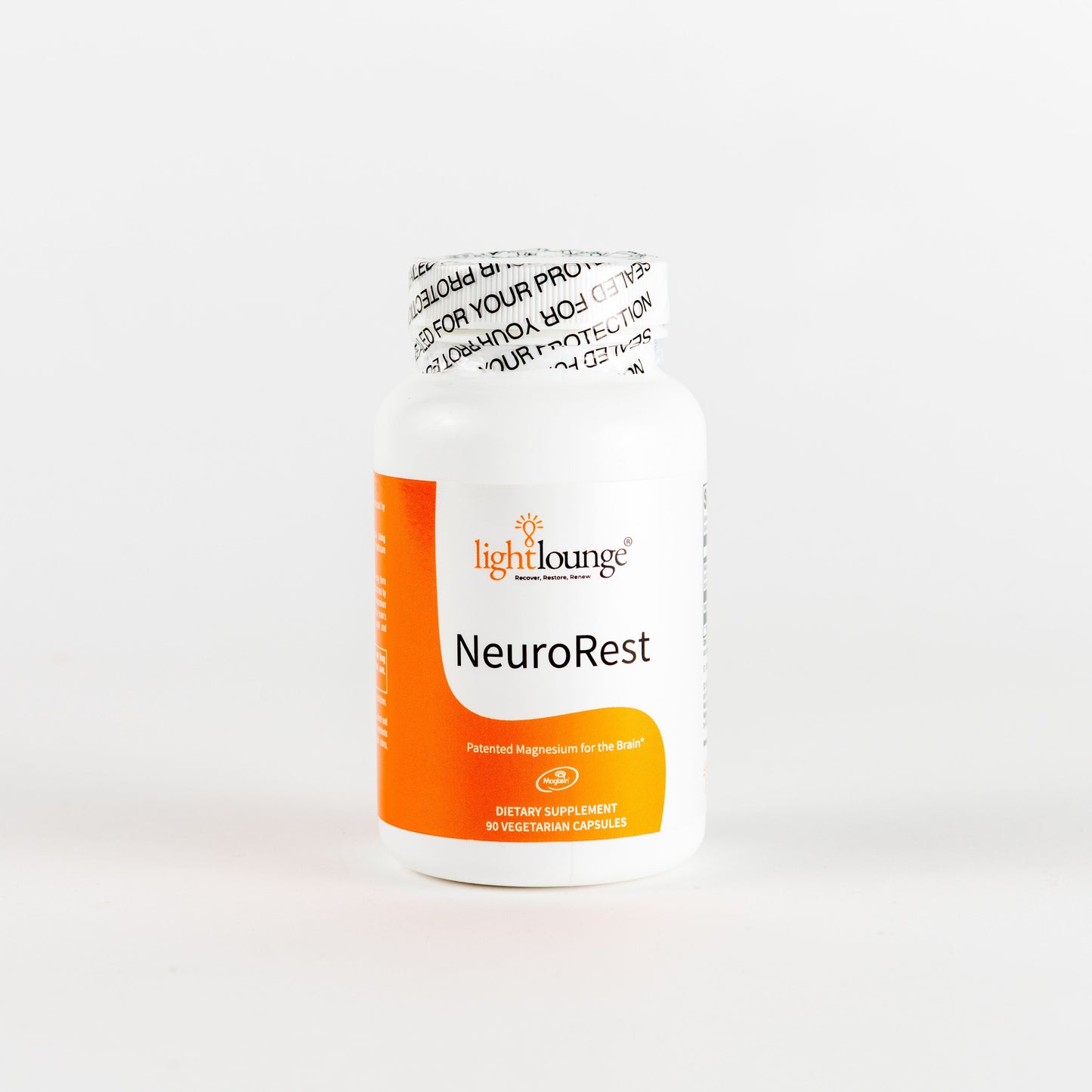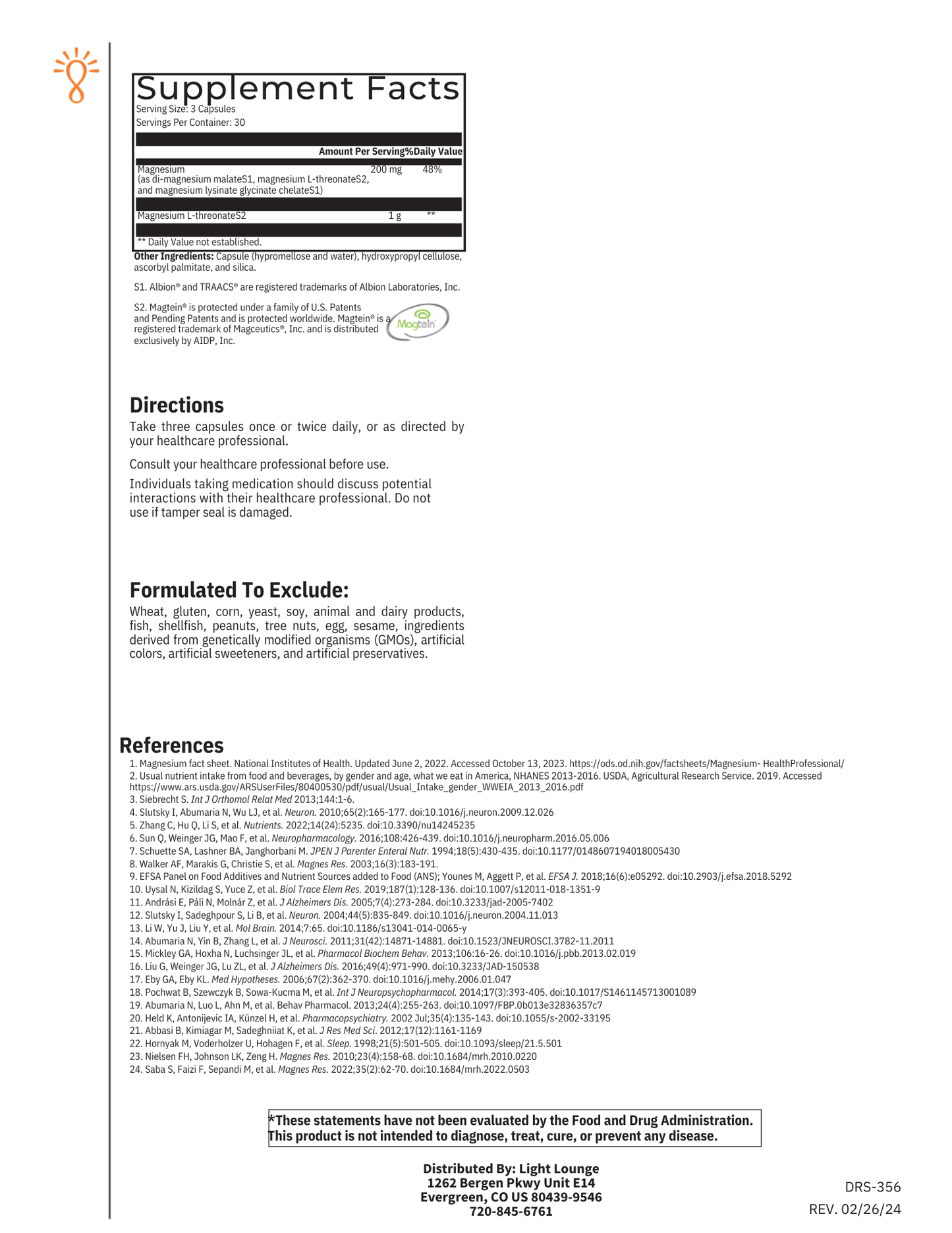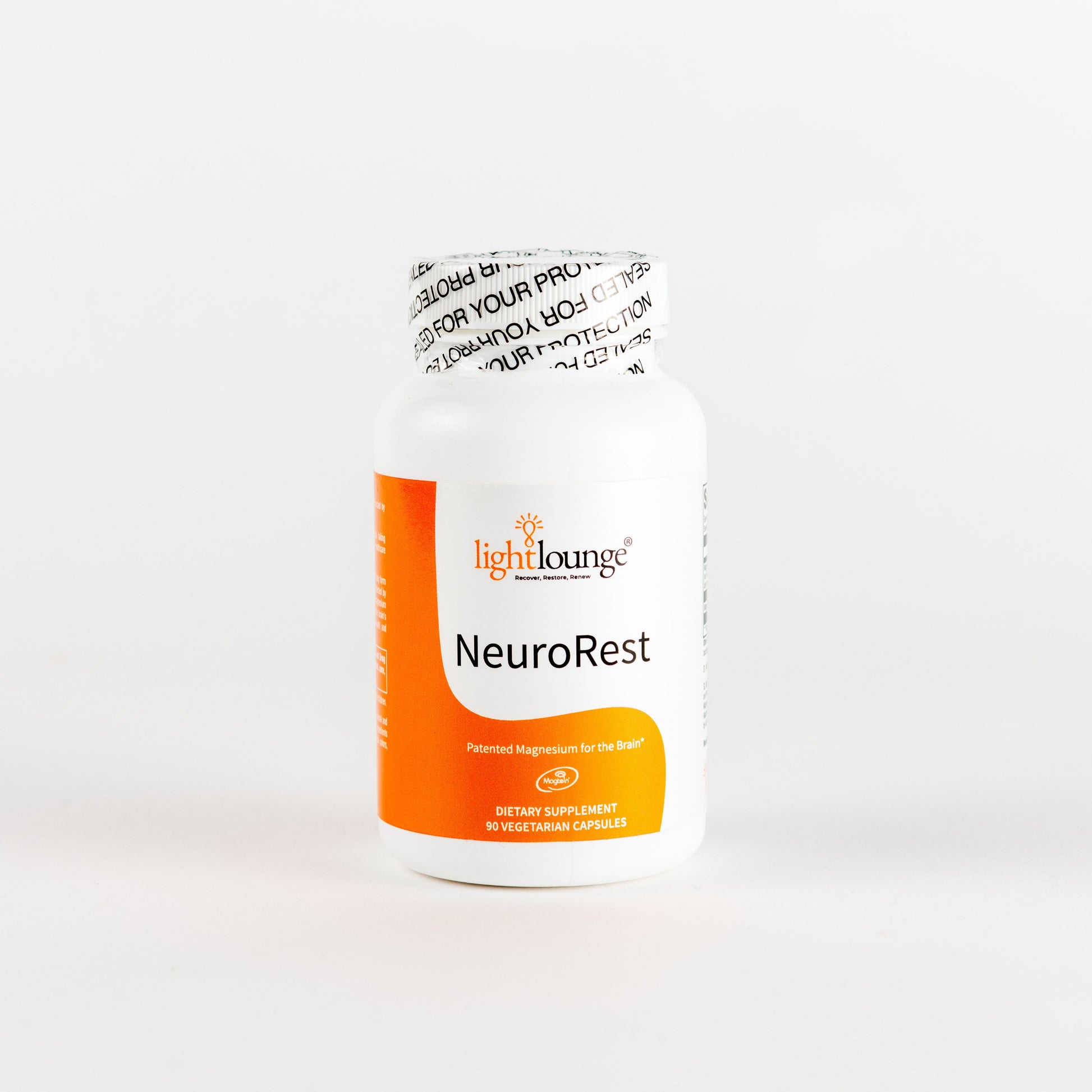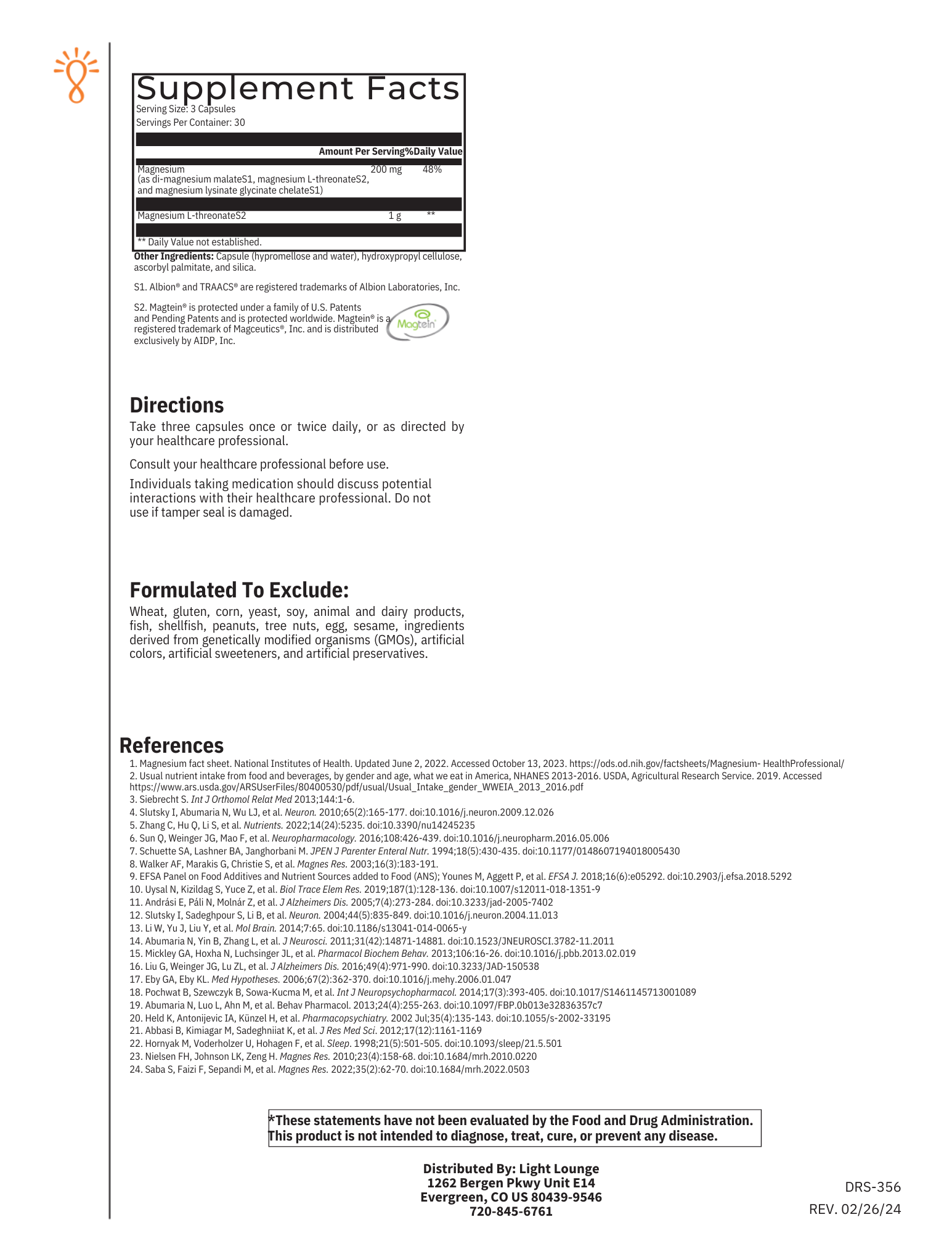

Description
Magnesium has numerous critical roles in human physiology, and its intake is imperative for supporting overall health. It is a cofactor in more than 300 enzymatic reactions that regulate essential functions, including energy production, blood pressure, blood glucose, bone development, and muscle and nerve function. Magnesium is widely available in foods such as whole grains, nuts and seeds, legumes, and green leafy vegetables.1 In the United States, dietary surveys show magnesium intake is consistently below age-specifc minimum recommended levels. An analysis of data
from the National Health and Nutrition Examination Survey (NHANES) found that nearly half of Americans ingest less magnesium from food and beverages than is recommended.2 Insufficient intake of magnesium is implicated in a wide range of health concerns, including those that affect the brain and nervous system.*1
Supplemental magnesium can help ensure optimal intake, yet absorption pathways vary among the different forms, and some types can cause gastrointestinal (GI) distress in those with impaired digestion. Factors affecting absorption, tolerance, and retention of supplemental magnesium include the status of magnesium stores in the body and the type or form of magnesium ingested.*3
Magtein® (Patented Magnesium L-Threonate)
More than 10 years of research at MIT went into developing Magtein, a magnesium compound comprised of magnesium and threonic acid commonly known as magnesium L-threonate. Magnesium L-threonate has been suggested to be more bioavailable than other sources of magnesium and has been studied for its unique ability to cross the blood–brain barrier delivering magnesium to brain cells.*4-6
Magnesium Lysinate Glycinate Chelate
Amino acids are used as chelating agents for magnesium to enhance bioavailability, stability, and safety. Chelates increase mineral bioavailability, protect magnesium from being bound in the GI tract, and lower the risk for osmotic diarrhea, which can occur in some forms.3 As an example of the increased bioavailability and tolerability of chelated minerals, the effect of magnesium diglycinate—a chelated form of magnesium bound to 2 glycine molecules—was assessed in subjects (N = 12) with ileal resections. Data from the results suggested that this form of chelated magnesium is likely absorbed intact via a dipeptide transport pathway in different areas of the gut than magnesium oxide, rendering it potentially more bioavailable in addition to being more suitable for those with intestinal resections.7
Another study evaluating magnesium absorbability in healthy human subjects (N = 50) demonstrated that magnesium amino acid chelate had better short-term (24 hours) and long-term (60 days) absorbability when compared with magnesium oxide, but the results were not statistically signifcant.*8 Magnesium lysinate glycinate chelate is a mineral amino acid chelate in which magnesium is bound to the amino acids lysine and glycine to create a complex that is readily absorbed across the intestinal wall like other chelated forms.*
Di-Magnesium Malate
This form of magnesium contains malic acid, which also forms a complex with magnesium. In a scientifc opinion paper, the European Food Safety Authority (EFSA) cited an unpublished, randomized trial in healthy volunteers (N = 14) in which the bioavailability and tolerability of 150 mg of magnesium from bisglycinate chelate, buffered bisglycinate chelate, and di-magnesium malate were found to be signifcantly higher than magnesium oxide.9 In an animal study, 5 magnesium preparations were evaluated by examining time-dependent absorption, tissue penetration, and effect on the behavior of the animals. Pharmacokinetically, the area under the curve calculation was highest for magnesium malate, suggesting enhanced bioavailability. Further research is needed in humans to assess the dose and effects of di-magnesium bound to malate on specifc tissues and behavior.*10
Brain Health and Cognitive Function
Magnesium has been suggested to play a role in promoting synaptic plasticity in the brain, helping brain cells respond to signals with clarity and
vigor without being overactivated. Cognitive decline has been linked to loss of synapse functionality*.11
Ingesting conventional magnesium compounds does not appear to elevate brain magnesium. However, animal studies have shown that magnesium L-threonate crosses the blood–brain barrier, resulting in increased magnesium in extracellular fuid and deposits in neural synapses, increased neural synaptic density, and improved cognitive function.4,12-14 Results from a study in rodents suggested that L-threonate is the only ligand to effciently transport magnesium into cerebrospinal fuid and then into neurons.6 To gain a deeper understanding of the mechanisms involved, animal research also found that magnesium L-threonate increased receptor signaling, specifcally, the signaling of the NR2B-containing N-methyl-D-aspartate (NMDA) receptor. These NMDA receptors are rich in the hippocampus and play a pivotal role in memory processes.4
Several preclinical animal studies that used assessments, such as the novel object recognition test (NORT), T-maze, Morris water maze, conditioned fear memory, and conditioned taste aversion, have validated the effectiveness of magnesium L-threonate in animals. In these studies, researchers demonstrated that when brain magnesium levels were increased, signifcant benefts were detected in multiple aspects of learning and memory in young and aged rodents.*13-15
The effects of magnesium L-threonate have also been studied in human trials. In
a randomized, double-blind, placebo-controlled trial, a magnesium L-threonate
complex signifcantly affected human cognition in subjects (N = 51) aged 50 to
70 years with self-reported memory, concentration, anxiety, and sleep issues.
Participants administered 1.5 to 2 grams of magnesium L-threonate complex
daily for 12 weeks demonstrated reduced cognitive declines compared with
age-matched controls. Furthermore, using normative TMT-B data from age-
matched subjects, the researchers calculated a particularly compelling impact
of magnesium L-threonate; after 6 weeks of treatment, the average brain age decreased from 69.6 ± 4.2 years to 60.6 ± 5.6 years, an improvement of 9.0 ± 3.5 years, and persisted after 12 weeks of treatment with 9.4 ± 3.5 years of improvement. In addition, it should be noted that the complex used in this study contained vitamins C, D, and B6, which could contribute to the beneficial effects attributed to magnesium L-threonate.*16
In the largest human trial to date investigating the cognitive effect of magnesium
L-threonate in healthy adults aged 19 to 65 years, subjects (N = 109) were randomly assigned to receive placebo or 1600 mg of a magnesium L-threonate combined with low levels of vitamin D, C, B6, and phosphatidylserine. Using a standard test for cognitive evaluation, subjects in the test group showed significant improvements in average scores for 5 key measures of learning, recall, and memory, with more improvement noted for all parameters in older participants.*5
Although human trials have suggested an effcacious role for compounds containing magnesium L-threonate in supporting cognitive health, additional randomized, placebo-controlled trials in larger groups of healthy individuals are needed to further clarify the optimal dose and benefits attributed to magnesium L-threonate alone.*
Stress, Sleep, and Mood
Because of its role in brain chemistry, magnesium is also known to beneft the body in ways that may counter stress, promote restful sleep, and support a healthy mood.17-19 In animal studies, magnesium administration has been shown to attenuate neurologic changes brought on by chronic mild stress.19 Experiments with magnesium L-threonate have shown promise for its use as a modulator of worry by increasing fear memory extinction and inhibiting fear overgeneralization.*14,19
In humans, analysis of case histories in magnesium-defcient individuals has helped researchers hypothesize magnesium’s role in mood improvement.17 Studies have suggested that magnesium supplementation may positively affect endocrine-related sleep changes associated with aging20 and improve objective and subjective measures of sleep.21-24 Further investigations are needed to confirm the role of supplemental magnesium and the dose needed to counter stress, promote restful sleep, and support a healthy mood.*
NeuroRest features di-magnesium malate, magnesium lysinate glycinate chelate, and magnesium L-threonate, a unique combination of magnesium formulated for enhanced bioavailability to support brain health and promote healthy nervous system functions.
*These statements have not been evaluated by the Food and Drug Administration.
This product is not intended to diagnose, treat, cure, or prevent any disease.

